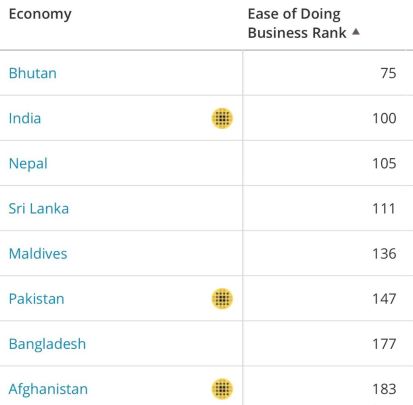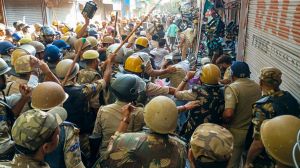This is what helped India go up in World Bank rankings in ‘ease of doing business’
The ranking comes as a shot in the arm for the Narendra Modi government amid dissenting voices in certain quarters about implementation of the Goods and Services Tax (GST) as well as demonetisation.
 In its annual report ‘Doing Business 2018: Reforming to Create Jobs’, the World Bank said that India’s ranking reflects nearly half of the 37 reforms, adopted since 2003, implemented in the last four years.
In its annual report ‘Doing Business 2018: Reforming to Create Jobs’, the World Bank said that India’s ranking reflects nearly half of the 37 reforms, adopted since 2003, implemented in the last four years.
India has jumped 30 places to rank 100th in the World Bank’s ‘ease of doing business’ ranking, helped by a slew of reforms in taxation, licensing, investor protection and bankruptcy resolution. The ranking comes as a shot in the arm for the Narendra Modi government amid dissenting voices in certain quarters about implementation of the Goods and Services Tax (GST) as well as demonetisation.
In its annual report ‘Doing Business 2018: Reforming to Create Jobs’, the World Bank said that India’s ranking reflects nearly half of the 37 reforms, adopted since 2003, implemented in the last four years.
Here’s what contributed to India’s leap in the ranking
Starting a Business: India made starting a business faster by merging the applications for the Permanent Account Number (PAN) and the Tax Account Number (TAN), and by improving the online application system. This reform applies to both Delhi and Mumbai. Mumbai also made starting a business faster by merging the applications for the value-added tax and the profession tax.
Dealing with Construction Permits: India made dealing with construction permits less cumbersome by implementing an online system that has streamlined the process at the Municipality of New Delhi and Municipality of Greater Mumbai. The online system has streamlined the process of obtaining a building permit, thereby reducing the number of procedures and time required to obtain a building permit in India.
Getting Credit: India strengthened access to credit by amending the rules on priority of secured creditors outside reorganization proceedings and by adopting a new law on insolvency that provides a time limit and clear grounds for relief to the automatic stay for secured creditors during reorganization proceedings. This reform applies to both Delhi and Mumbai.
Protecting Minority Investors: India strengthened minority investor protections by increasing the remedies available in cases of prejudicial transactions between interested parties. This reform applies to both Delhi and Mumbai.
Paying Taxes: India made paying taxes easier by making payment of EPF mandatory electronically and introducing a set of administrative measures easing compliance with corporate income tax. This reform applies to both Delhi and Mumbai.
Trading across Borders: India reduced import border compliance time in Mumbai by improving infrastructure at the Nhava Sheva Port. Export and import border compliance cost were also reduced in both Delhi and Mumbai by eliminating merchant overtime fees and through the increased use of electronic and mobile platforms.
 South Asian economies in the World Bank ranking
South Asian economies in the World Bank ranking
Enforcing Contracts: India made enforcing contracts easier by introducing the National Judicial Data Grid, which makes it possible to generate case measurement reports on local courts. This reform applies to both Delhi and Mumbai.
Resolving Insolvency: India made resolving insolvency easier by adopting a new insolvency and bankruptcy code that introduced a reorganization procedure for corporate debtors and facilitated continuation of the debtor’s business during insolvency proceedings. This reform applies to both Delhi and Mumbai.
Labor Market Regulation: India increased the mandatory length of paid maternity. This reform applies to both New Delhi and Mumbai.
Getting Electricity: India made getting electricity faster and cheaper by streamlining the process of getting a new commercial electricity connection. This reform impacts Delhi. The utility in Delhi made the process for getting an electricity connection simpler and faster by eliminating the internal wiring inspection by the Electrical Inspectorate. The utility in Mumbai reduced the procedures and time required to connect to electricity by improving internal work processes and coordination.
(With agency inputs)







- 01
- 02
- 03
- 04
- 05
























